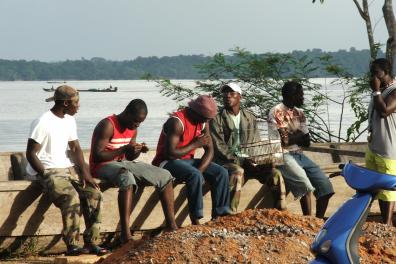Pratiques langagières - terrains, méthodes, théories

L’objectif de ce séminaire est d’accompagner les M2 et doctorant.e.s intéressé.e.s par l’utilisation de pratiques langagières dans des contextes comme la famille, l’école, le travail, la santé ou la justice, traversés d’enjeux de pouvoir et d’inégalités. Une place importante est laissée aux approches méthodologiques et cadres théoriques pertinents (sociolinguistique interactionnelle, sociolinguistique critique, sociologie du langage, analyse de discours, anthropologie linguistique, anthropologie politique etc.) et à la circulation de savoirs issus de zones géographiques et traditions académiques variées afin de mettre en lien l’étude des pratiques langagières avec des problématiques socio-anthropologiques et politiques contemporaines. En 2024-2025, le séminaire se focalise sur les questions de discriminations.
Dates du séminaire en 2024-2025 : 07/02, 07/03, 04/04.
Lieu : salle LO.01 à la Maison de la recherche de l'Inalco (2, rue de Lille - 75007 Paris)
(sauf le 07/02 exceptionnellement au PLC 65 rue des Grands Moulins, Amphi 8).
Les conférences sont également retransmises via Zoom.
Séance du 7 février 2025
Lieu : PLC (65, rue des Grands Moulins - 75013 Paris - Amphi 8) - exceptionnellement
Horaires : 14-17h
- Birgül Yılmaz (University of Exeter) : Linguistic precarity and (im)mobility in Greece
Based on an 18 month long ethnographic fieldwork in Athens, where I observed English language classes organised in a radical cafe, where I met a group of refugees who lived in a squat, in this presentation, I focus on how (im)mobility shapes refugees’ linguistic needs. I investigate how waiting as a bordering technology and language learning practices of refugees intersects whilst they plan their journeys to northern Europe via human smugglers. The notion of linguistic precarity refers to uncertainties, anxieties, vulnerabilities, insecurities experienced by individuals who make temporary investments in their language learning choices. I discuss how my participants mobilise vulnerability, lack of language(s), through self-organised teaching and learning, to reduce their condition of precarity.
Séance du vendredi 7 mars 2025
Lieu : Maison de la Recherche de l'Inalco, 2 rue de Lille (Paris 7e), salle L0.01. Le séminaire sera également accessible par zoom (https://zoom.us/j/97206470067).
Horaires : 14h-17h
- Ian Cushing (Manchester Metropolitain University) : Designing futures of linguistic justice: teachers dismantling deficit thinking in schools
Deficit thinking is a person-centred, victim-blaming ideology which deflects attention away from structural injustices and frames marginalised communities as deficient and requiring remediation – especially about language, and especially in schools. Whilst such ideologies are long-standing and pervasive, recent work has exposed a resurgence of deficit thinking about language in England’s education policy architecture. This talk examines efforts by teachers to dismantle deficit thinking in the pursuit of linguistic justice. It draws on data from a longitudinal project where I collaborated closely with a group of teachers in coordinated attempts to dismantle deficit thinking at individual, departmental, and institutional levels. As part of this collaboration, we designed a flexible, proactive framework for anti-deficit struggles about language. This included rejecting dominant language ideologies; teachers as activists; cross movement solidarity and collective struggles; institutional support; building on historical efforts, and abolitionist visions for transformative change. I talk through aspects of this framework and its potential in contributing to linguistic justice efforts.
Séance du vendredi 4 avril 2025
Lieu : Maison de la Recherche de l'Inalco, 2 rue de Lille (Paris 7e), salle L0.01. Le séminaire sera également accessible par zoom (https://zoom.us/j/97206470067).
Horaires : 14h-17h
- Philipp Angermeyer (York University) : Discriminatory translation and paths towards linguistic justice
In multilingual institutional settings, the use of interpreters or translators is generally treated as a remedy to linguistic inequality, that is, as a benevolent activity conducted for the benefit of speakers of non-official languages. However, institutional choices of what is translated and how can effectively lead to discrimination against these speakers, for example by systematically restricting their participation in institutional interaction, or by perpetuating discriminatory stereotypes about them, a phenomenon for which I have proposed the term punitive multilingualism.
Drawing on examples from my research on court interpreting (Angermeyer 2015) and linguistic landscape (Angermeyer 2017, 2023), I examine how institutional practices of translation often benefit primarily the institution, and also how they index ideologies about languages and their speakers. To pursue paths towards greater linguistic justice in multilingual context, I argue for a need to examine translation practices within a wider context of ideologies about language contact, language variation, raciolinguistics and linguistic diversity.